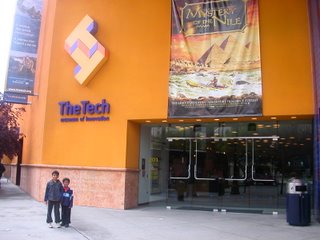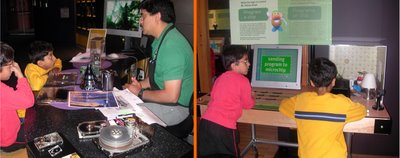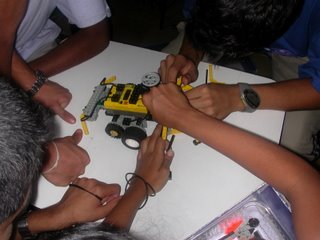Read an article recently - Web 2.0: A New Wave of Innovation for Teaching and Learning? in the March/April 2006 issue of Educause Review. The article, which was mostly a descriptive account of the emergent “social software” and tools that justify the 2.0 in the moniker 'Web 2.0', fell somewhat short in its analysis of how these would lead to innovative teaching and learning, other than mentioning the obvious affordances of the read-write web in collaborative projects in higher ed.
Reading the article left me a bit depressed – this emerging new web paradigm is progressing too fast (even by Web standards, according to the article) for us to keep pace. The education community in India has barely tapped the enormous potential of the old web (Web 1.0, if you will). There are enough tools for collaboration even in our familiar Worldwide Web of old. How many teachers here are using even easy-to-setup-and-use e-groups or wikis or even email for telementoring or collaborative projects? How many have even heard of Webquests? Why are urban schools with email-savvy teaching staff that has access to the internet not using the affordances of the internet for communication (a la corporate houses)? In this world, RSS probably means little more than Rashtriya Swayamsevak Sangh!
It is not my intention to suggest that it is mandatory that every available technology be used by every educator. But what stops a teacher from exploring these new tools that don’t cost anyone anything other than some time and effort? While some of these do require a cursory understanding of xml and html, simple blogging and social bookmarking tools such as del.icio.us don’t. To me all this again points to the lack of digital fluency among the majority of our teaching population as well as a dearth of educational technologists who can help teachers stay abreast of tech advances and even aid teachers in such explorations (ref. my post on Enabling Conditions for Successful Technology Use).
If the aim of every good teacher and school today is to prepare children for the 21st century, are they not obligated to provide these children with exposure to the new paradigms of interactions – and the openness and social quality that are the hallmark of collaborative work in this century?
Tuesday, March 21, 2006
Friday, March 17, 2006
Weblogg-ed
No conversation about blogs in education is complete without at least a mention of the blog dedicated solely to the subject - Weblogg-ed.
Other sites worthy of note - edublogs.org - for setting up free blogs on education.
Schoolblogs, also a free service for educational blogs and set up on the Manila platform, has great features (a discussion board for asynchronous threaded discussions, and the ability to upload files & links), but it seems to be plagued by technical issues - it is slow and downtimes are frequent. (I even set up the PPSE group blog and "bulletin board" there at first, but we had to abandon it due to these recurring technical problems).
Other sites worthy of note - edublogs.org - for setting up free blogs on education.
Schoolblogs, also a free service for educational blogs and set up on the Manila platform, has great features (a discussion board for asynchronous threaded discussions, and the ability to upload files & links), but it seems to be plagued by technical issues - it is slow and downtimes are frequent. (I even set up the PPSE group blog and "bulletin board" there at first, but we had to abandon it due to these recurring technical problems).
Blogging in the Classroom (...not literally!) / Blogging Teachers
A comment on a post here touched on the issue of blogs in education – something I’ve given much thought to over the last year or so. Much has been written about the benefits of blogs especially in the context of K-12 education – mostly ideas around publishing and collaborative learning, facilitated by the ease of setup and use of this tool. The last couple of years have seen a phenomenal rise in the use of blogs in the classroom in the US.
[In keeping my with firm beliefs in first making teachers aware and fluent in the technology we would like them to use], I do think that we cannot expect teachers to design curriculum around blogs unless they’ve experienced blogging first-hand. So teacher awareness about the world of blogs one of the goals I set out to achieve this past year.
Educational Blogging (an article that appeared in the Sept/Oct 2004 issue of Educause) was one of the earlier writings on this subject. It was this article that I distributed to a group of teachers that I work with (at MAIS, Bangalore) as an introduction to the world of blogging in education. As part of the team that was facilitating a teacher professional development program (called Professional Practice and Studies in Education, or PPSE) for these teachers, and designing their coursework, I worked the use of blogs into their PD curriculum – having them reflect on their teaching practice or any other specified topic, on their personal blogs that I helped them set up. (I think a teacher’s blog could serve well as his/her e-portfolio too). I also set up a group blog that would operate as a common platform for discourse on education, or even just for announcements and general communication among the group.
Some of these efforts were also aimed at building a community of practice (CoP). Teaching is known to be (to a large extext) a solitary activity and we wanted to set up modes of communication that would alleviate some of the isolation teachers experience in their profession.
As was expected, some of the 21 teachers who are part of the PPSE program took to blogging more easily than others. All in all, it's been a rewarding experience. The fact that some teachers have started blogs for their subjects with their students is icing on the proverbial cake. Mission Accomplished!!!
(Unfortunately in a country such as ours, hesitancy in written communication in English can be a huge stumbling block in such an endeavor even for some teachers in urban English-medium schools such as 2nd and 3rd language teachers. Will save that for a later discussion…)
[In keeping my with firm beliefs in first making teachers aware and fluent in the technology we would like them to use], I do think that we cannot expect teachers to design curriculum around blogs unless they’ve experienced blogging first-hand. So teacher awareness about the world of blogs one of the goals I set out to achieve this past year.
Educational Blogging (an article that appeared in the Sept/Oct 2004 issue of Educause) was one of the earlier writings on this subject. It was this article that I distributed to a group of teachers that I work with (at MAIS, Bangalore) as an introduction to the world of blogging in education. As part of the team that was facilitating a teacher professional development program (called Professional Practice and Studies in Education, or PPSE) for these teachers, and designing their coursework, I worked the use of blogs into their PD curriculum – having them reflect on their teaching practice or any other specified topic, on their personal blogs that I helped them set up. (I think a teacher’s blog could serve well as his/her e-portfolio too). I also set up a group blog that would operate as a common platform for discourse on education, or even just for announcements and general communication among the group.
Some of these efforts were also aimed at building a community of practice (CoP). Teaching is known to be (to a large extext) a solitary activity and we wanted to set up modes of communication that would alleviate some of the isolation teachers experience in their profession.
As was expected, some of the 21 teachers who are part of the PPSE program took to blogging more easily than others. All in all, it's been a rewarding experience. The fact that some teachers have started blogs for their subjects with their students is icing on the proverbial cake. Mission Accomplished!!!
(Unfortunately in a country such as ours, hesitancy in written communication in English can be a huge stumbling block in such an endeavor even for some teachers in urban English-medium schools such as 2nd and 3rd language teachers. Will save that for a later discussion…)
Tuesday, March 14, 2006
iDiscoveri Ed Offerings
While on the subject of quality education for educators in India --
iDiscoveri is also launching 2 Post-Graduate Diploma programs (*note* in India 'undergraduate' is refered to as 'graduate' and 'graduate' as 'post-graduate') - one in Innovative Teaching and one in Educational Leadership.
The organization has grown to be a force to reckon with and is certainly living its vision of reviving education in India. (Incidentally, the CEO and one program head were in my Ed.M. class at Harvard Graduate School of Education in 2001-2002). The PG courses on education are obviously in answer to the crying need for such programs in India.
Unfortunately, none of these new programs have any course offerings on the use of technology in education. It's time for someone to wake up to that reality and address that need as well - I'll be happy to offer my services to the cause...
iDiscoveri is also launching 2 Post-Graduate Diploma programs (*note* in India 'undergraduate' is refered to as 'graduate' and 'graduate' as 'post-graduate') - one in Innovative Teaching and one in Educational Leadership.
The organization has grown to be a force to reckon with and is certainly living its vision of reviving education in India. (Incidentally, the CEO and one program head were in my Ed.M. class at Harvard Graduate School of Education in 2001-2002). The PG courses on education are obviously in answer to the crying need for such programs in India.
Unfortunately, none of these new programs have any course offerings on the use of technology in education. It's time for someone to wake up to that reality and address that need as well - I'll be happy to offer my services to the cause...
Monday, March 13, 2006
Hands-on Learning
Talking about the "hands-on" learning at The Tech in an earlier post reminded me of a picture taken at a session of the Robotics Club @ Aditi which I run for high school kids at Mallya Aditi International School, Bangalore.
This one's a personal favorite - quite literally "hands-on" learning! The Robotics Club sessions are fun! Learning is incidental...
This one's a personal favorite - quite literally "hands-on" learning! The Robotics Club sessions are fun! Learning is incidental...
Masters in Education at TISS
A recent article in the Deccan Herald with Dr Padma Sarangapani's comments on the new M.A. in Education refered to in my previous post.
Sunday, March 12, 2006
Education - A legitimate field of study?
The cover story of latest issue (March 19) of The Week is "Best Degrees" with President Kalam's "exclusive" on The Mission of Education. The irony is that Education itself does not feature anywhere in the surveys as a program of study in India - not in the undergraduate or graduate degrees; not even as a diploma program where courses such as 'Technical Writing', 'Digital Designing', 'Hotel Management', 'Fashion Technology', 'Medical Laboratory Technology' and 'Nursing' make the cut. Is it even considered a legitimate field of study in India?
Dr. Kalam has obviously given much thought to several issues that plague the system of education in the country and he has suggested several workable solutions that policymakers would do well to pay heed to. But when the President waxes eloquent about the what could and should be done to lay the "foundation for best students and best degrees...in pre-primary, primary and secondary education" does he or anyone else stop to think how the nation is building its workforce of teachers, principals, administrators, policymakers and leaders in the field of education? Or are these all areas of expertise that do not merit any formal education and training? When he states that "the teacher has to be equipped with all the knowledge required for effective teaching", should he not also suggest bettering the lot of formal programs in teacher education?
With customary vision, the President espouses the benefits of leveraging technology in education. He commends the use of "computer aids" in Karnataka where children "have a creative learning with the tools of creative animation through the use of computers." He dedicates a whole paragraph to Technology Enhanced Education. His thrust is on using technology for distance learning and digital libraries. He anticipates falling prices of computers and communications bandwidth driving increased use of technology in education, and envisions "virtual classrooms of the future." Amen to that.
Much can be done in real classrooms and schools too, even today, with existing infrastructure - if only people decided to acquire some expertise in teaching - the kind of expertise that will come from engaging with the subject in an undergraduate program of worth, wrestling deeply with such issues at the graduate level, heck, even just becoming aware of them in a diploma course. The recently instituted Masters in Education at TISS (in collaboration with NIAS, Homi Bhabha Centre for Science Education, Eklavya, Vidya Bhawan Society, and Digantar) certainly gives reason to cheer...
Dr. Kalam has obviously given much thought to several issues that plague the system of education in the country and he has suggested several workable solutions that policymakers would do well to pay heed to. But when the President waxes eloquent about the what could and should be done to lay the "foundation for best students and best degrees...in pre-primary, primary and secondary education" does he or anyone else stop to think how the nation is building its workforce of teachers, principals, administrators, policymakers and leaders in the field of education? Or are these all areas of expertise that do not merit any formal education and training? When he states that "the teacher has to be equipped with all the knowledge required for effective teaching", should he not also suggest bettering the lot of formal programs in teacher education?
With customary vision, the President espouses the benefits of leveraging technology in education. He commends the use of "computer aids" in Karnataka where children "have a creative learning with the tools of creative animation through the use of computers." He dedicates a whole paragraph to Technology Enhanced Education. His thrust is on using technology for distance learning and digital libraries. He anticipates falling prices of computers and communications bandwidth driving increased use of technology in education, and envisions "virtual classrooms of the future." Amen to that.
Much can be done in real classrooms and schools too, even today, with existing infrastructure - if only people decided to acquire some expertise in teaching - the kind of expertise that will come from engaging with the subject in an undergraduate program of worth, wrestling deeply with such issues at the graduate level, heck, even just becoming aware of them in a diploma course. The recently instituted Masters in Education at TISS (in collaboration with NIAS, Homi Bhabha Centre for Science Education, Eklavya, Vidya Bhawan Society, and Digantar) certainly gives reason to cheer...
Exploratory Learning Environments
 The Tech Museum of Innovation (popularly known simply as "The Tech") in San Jose is such a wonderful space that works to de-mystify the whole "technology" thing for kids (and interested adults as well). From visual representations of the boolean logic that drives circuits to chunks of silicon and the insides of all kinds of electronic components of computers and other gadgets that are all around us - kids can "see", "touch", "feel", "experience"...
The Tech Museum of Innovation (popularly known simply as "The Tech") in San Jose is such a wonderful space that works to de-mystify the whole "technology" thing for kids (and interested adults as well). From visual representations of the boolean logic that drives circuits to chunks of silicon and the insides of all kinds of electronic components of computers and other gadgets that are all around us - kids can "see", "touch", "feel", "experience"...Schools in the area leverage the presence of this fantastic informal learning environment and avail of the various events and activities that the Museum aims at schools. The Tech runs summer camps and also the hugely popular annual "Tech Challenge" for school kids.
This museum obviously benefits from being in the heart of Silicon Valley for ideas and artifacts. Why can we not have a similar space in India, in Bangalore - purportedly the "Silicon Valley" of India? There is no dearth of tech activity around here; sadly, there's just a dearth of good intent that will translate into action...

Hands-on and Interactive - A 'desi' explains the history of the silicon chip (left picture)
Subscribe to:
Posts (Atom)

